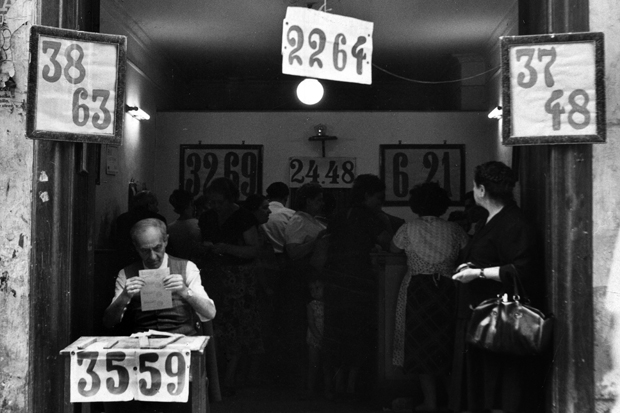Naples, ragamuffin capital of the Italian south, is reckoned to be a hive of pickpocketing and black-market manoeuvrings. (A Neapolitan gambling manual advises: ‘Rule Number 1 — always try to see your opponent’s cards.’) Crime is not the whole picture, of course. To look out across the Bay of Naples remains a visual education in the grand style as the twin, dromedary-like mounds of Vesuvius shadow the dead cities of Pompeii and Herculaneum.
Erri De Luca, one of Italy’s bestselling authors, was born in Naples in 1950, and understands perfectly the city’s obscure exuberance of life. The Day Before Happiness, a novella, unfolds amid the card-sharps, prostitutes and barefoot scugnizzi (urchins) who scrimped and scuffled in the city during the postwar years. The narrator, an orphan, is very much a product of the moral and material ruins of fascism, being disaffected and homeless. He is looked after by an elderly apartment concierge, Don Gaetano, who brings him food and teaches him how manipulate the Naples lottery with the aid of the gambling cabbala known as La Smorfia, in which dreams are assigned a corresponding lottery number (Diego Maradona, 23; the Holy Madonna, 8).
A loquacious man, Don Gaetano regales his ward with stories of wartime Naples, when the occupying Germans rounded up and murdered Jews, and famished locals ransacked the municipal aquarium for its tropical fish. (Nothing, absolutely nothing, that can be managed by the human digestive system is wasted in Naples, though what sort of pasta dishes resulted from the aquarium raid is unknown.) The narrator, awed by Don Gaetano’s fluency in what Neapolitans call l’arte di arrangiarsi, ‘the art of getting by’, dutifully writes down all he says about the war and consequently brings Naples vividly to life for the reader. The city’s dark, corridor-like streets seem to owe something to the souks of the Middle East — something to the Levant.
Unknown to the narrator, his girlfriend Anna is engaged to be married to a Neapolitan so-called ‘man of honour’. On his release from jail the camorrista lunges at the unsuspecting suitor with a butcher’s knife. Nothing much else happens in this slender if atmospheric novel (very nicely translated by Jill Foulston). No doubt The Day Before Happiness is intended to capitalise on the worldwide success of Elena Ferrante’s Neapolitan quartet. By comparison De Luca’s book is no masterpiece, but those who love Naples (as I do) will find something to enjoy here.






Comments